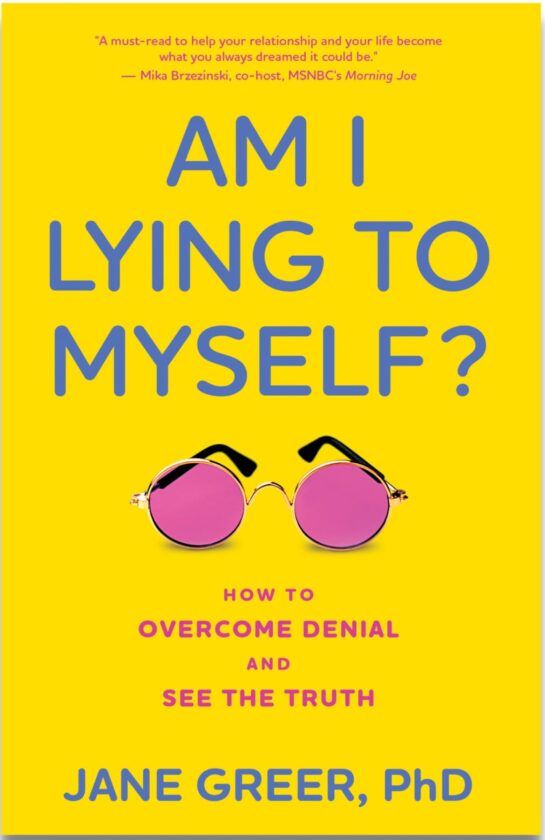Denial is everywhere, keeping us from seeing reality and causing unhappiness and frustration. Unless we learn to talk back to denial and start telling ourselves the truth, is will only provide a quick fix — a fix that will eventually have its reckoning. Marriage and family therapist, Dr. Jane Greer, is the author of six books, including her latest, Am I Lying To Myself?, which reveals how to unmask denial in ourselves and how to deal with denial in others. Dr. Greer is an expert in love and relationships. She offers ways to let in the voice of reason — that voice that says he’s drinking too much or he’s probably never going to call or she’s being unfaithful — that we don’t want to hear but must in order to be honest with ourselves, find clarity, and live a healthier emotional life.
Why do people so often use denial when they don’t want to face problems in their lives?
Denial makes us to think our life is better than it is — the way we want it to be, the way we wish it could be — rather than what it truly is. Denial reassures us that things aren’t too bad, they could be worse, but it leaves us with short-sighted solutions and a temporary fix.
In Am I Lying to Myself, you’ve assigned names to the types of denial that people tend to fall into. Please describe a few of these.
Denial often shows up in our intimate relationships. For example, in the “Lose Yourself Relationship,” an individual becomes so enmeshed in the other person’s life that their own needs become sacrificed and slowly slip away. The end result can be a very unbalanced partnership, leading to conflict and resentment.
In what I refer to as a “Going Nowhere Relationship,” all the watch-out signs are there, but individuals typically want the relationship so badly that they tend to overlook, ignore, and dismiss their partner’s behaviors.
Another, “Demander’s Denial,” is when you recognize that you’ll never be able to change another person’s expectations of you no matter what, but you can change your own expectations of them and that will make a huge difference.

You share several instances of partners who turn a blind eye to relationship troubles in your book. What does it take for people to wake up to their own denial? Give us an example.
This happens a lot in relationships where infidelity is taking place. That’s where my skill “Look In the Rearview Mirror” is helpful. You need to pay attention to all the signs of things changing or being different in your relationship so that you’re aware of what’s going on around you. If your partner tells you they are working late at the office, and it suddenly turns into two or three times a week, it’s important to look closely at other behaviors that may be different so that you’re not blindsided by the cheating. Waking up to denial requires being honest with yourself so that you can then be direct and demand the truth from your partner.
In the case of a patient that I’ll call “Trudy,” who was married to “Glenn,” she witnessed all sorts of signs that Glenn was having an affair with their neighbor, “Nina” — their body language when they stood near each other, walking in on them sitting together in the backyard when she came home unexpectedly, and Glenn’s sudden interest in his appearance and getting in shape. Yet Trudy kept explaining them away, deluding herself with the fantasy that the affair wasn’t happening.
Trudy needed to “Look in the Rearview Mirror” to understand that some things were closer than they appeared. She needed to acknowledge and accept what she was seeing instead of brushing it off. Trudy eventually confronted Glenn about the behaviors and he admitted everything. She and Glenn were able to work things out, but Trudy vows that she’ll keep a constant eye in her rearview mirror and ask Glenn right away about any “Watch-Out Signs” so that denial can’t take hold.
Family dynamics can play out in ways that involve using guilt as a tactic for making continuous demands. How do you advise that family members handle the unreasonable demands made of them?
It’s essential to distinguish between norms and expectations; they’re not interchangeable. It’s clear that those who employ guilt trips prioritize achieving the result they desire without being cognizant of the potential harm caused by their demands.
It’s unlikely that you’ll be able to make them aware that they’re attempting to get you to agree to their demands by making you feel guilty or that you’re not good enough. Instead, you need to put boundaries in place for yourself regarding what you can and will do so that you can say “no” to demands that seem unreasonable. Having clarity about what you will and won’t do will help you avoid feeling guilty.
How can we help others who don’t seem to recognize that they’re in denial? Again, please share an example.
One of the most challenging elements of dealing with difficult behavior in those you care about is accepting the reality of your constraints. The truth is you can’t get people to see that they’re in denial, nor should you. Instead, it’s up to you to recognize their blindness and change your behavior in relationship to it.
For example, one client who I’ll call “Paula,” decided to tell her mother that she was upset with her for being so oblivious to how overwhelming and busy her life was raising her two children and working. She felt her mother was selfish and demanding of her to do a million things and spend time bombarding her with what felt like unfair expectations. But when she confronted her mother’s denial of how full her life was, her mother because furious with her and told her she was a neglectful daughter who didn’t love or care about her. There was no way that Paula was going to get her mother to “see” her and consider Paula’s needs along with her own.
The goal for Paula was to determine what she could do that would help her mother, but also leave room for Paula to consider her own needs — what it would take for her to feel that she was being a good enough daughter separate from what her mother thought of her.
Is it possible to keep relationships intact once you stand up to another’s denial?
That depends. Sometimes when you change the way you interact with someone in response to their denial, they will adapt and engage with you in a healthier way. Other times, however, they may be too angry or hurt to accept the new boundaries and limits you put in place. It’s the commitment and effort of both individuals that ultimately will determine the fate of a relationship.
To learn more about dealing with denial, visit www.drjanegreer.com.

